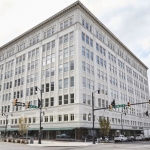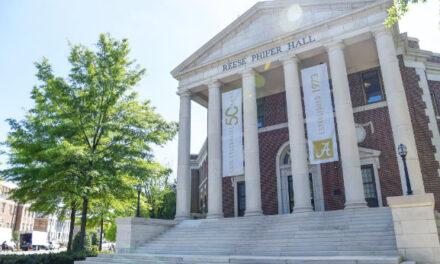The Birmingham Times
The Pizitz, one of Birmingham’s most iconic downtown buildings, is up for sale.
The Cushman & Wakefield Sunbelt Multifamily Advisory Group announced Tuesday it has the exclusive listing of The Pizitz, a 143-unit luxury apartment community with 41,679 SF of ground floor, mezzanine, and lower level commercial space.
In 2023, The Pizitz will turn 100 years old. Built in 1923, the building was once the flagship department store for the Alabama-based, family-owned department store chain Pizitz.
Closed in 1988, the building was restored and redeveloped for $70 million beginning in 2014 by Bayer Properties. The building reopened in 2016 after 24-months of work. Along with the apartments, the building added several amenities, including:
–The Pizitz Food Hall, home to 13 food stalls and a bar
–Forge, a coworking office space
–Two 100-seat cinemas with lounges, a bar and concession stand along with a classroom and administrative offices for the Sidewalk Film Festival
The Pizitz is located along the 2nd Avenue North corridor and serves as a connecting point from the bustling business district to surrounding attractions such as the McWane Science Center, Lyric Theatre, Alabama Theatre, Regions Field and Railroad Park.
The Pizitz Building, which formally opened in March 2017, is located in the heart of Birmingham’s historic retail and theater district, and has come to represent the city’s past and future. With a $70 million renovation of the former 1920s department store, the building was restored and transformed by Bayer Properties into a mixed-use destination.
The building combines modern residences, dining, and retail and office space into one downtown location. The restoration of the entire 251,000-square-foot building, which had sat vacant for 28 years, was completed in December, 2016.
Since being redeveloped and reopened, the Pizitz Building has created jobs, given people a place to live, and contributed to the success of other businesses downtown—not to mention that it has given local entrepreneurs a place for their business to create a stream of income and become one of the most influential mixed-use projects in Birmingham.
In addition to the food hall and retail stores on the first floor of the Pizitz, the building also has a courtyard for outdoor dining and events, plus a seven-level attached parking deck with more than 300 spaces.
The Pizitz Building is named after Russian immigrant Louis Pizitz, who started the Louis Pizitz Dry Goods Company in 1899; the business evolved into a chain of department stores. The eight-story building was designed by Harry B. Wheelock and completed in 1923. At its peak, 13 Pizitz stores were in operation including nine in Birmingham and two in Huntsville. By 1986, the chain was sold to Jackson, Miss.-based McRae’s, though the Pizitz family retained ownership of many of the actual buildings. The downtown Birmingham building was shuttered in 1988, while other locations were converted to McRae’s department stores.
The Sidewalk Moving Picture Festival occupies a year-round basement-level entertainment space in the Pizitz Building, with office space and two 100-seat screening rooms; the facility is currently under construction and projected to open later this year, in late summer or early fall.
Sidewalk Cinema joins the Imax Dome Theater, which is across the street at the McWane Science Center, and the Alabama, Lyric, and Carver theaters in what is considered downtown Birmingham’s Theatre District.
Another unique feature of the historical rejuvenation is a large antique clock that hangs above the food hall on the north side of the Pizitz Building. The long-forgotten fixture was discovered in the early stages of renovation and restored to its original condition. Bayer Properties leaders decided to relocate the clock to a prominent position within the food hall for all to enjoy.
Many Pizitz Food Hall visitors call attention to the architecture.
“This architectural gem means so much to the history of Birmingham, and we are delighted to be part of the resurgence of downtown by repurposing this historic building,” Jeffrey Bayer, founder and owner of Bayer Properties has said. “Our goal was to create an environment that is a vibrant gathering spot for residents of and visitors to Birmingham. The food hall is a tremendous complement to the office space and apartment homes that are part of the vision, [helping to] fulfill our commitment to create an urban village atmosphere.”
www.bhamnow.com contributed to this report. For more on the modern, mobile guide to Birmingham guide visit here











